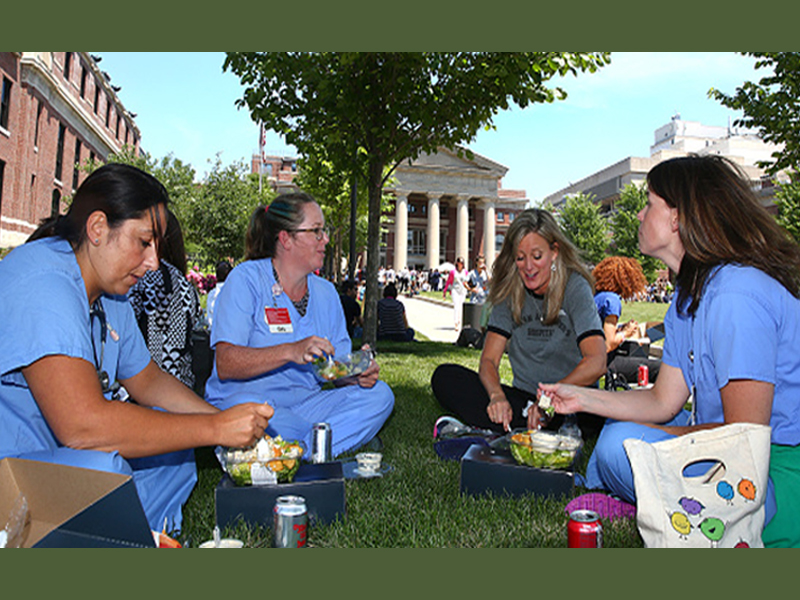Scrub the Scrubs

A picture of four surgical intensive care nurses sitting cross-legged on the lawn and enjoying their lunch before a press conference accompanied an article in the Boston Globe about the averted nursing strike at the Brigham and Women’s Hospital (1). Three of the nurses wore scrubs with their hospital ID badges attached, one sat in regular clothes. I was glad to see that the hospital administration and the nursing union had come to an agreement in a dispute that was not only about money and benefits but also about caring.
The picture also brought up thoughts that tend to cross my mind when seeing scrubs in public. Did the intensive care nurses just come from their units in the same clothes they wore attending patients with infections? Would they rub off on the public in the possibly tight quarters of a press conference? Will they go back to work afterwards and bring traces of soil and whatever microbes they might pick up back to their patients who may be immuno-compromised?
As a member of the public I usually can’t know where the bearers of hospital scrubs are coming from or going to. When sitting on the T next to a scrub-wearing professional I also get these tinges of discomfort: Are they coming from their job and rubbing off hospital bugs on me and everyone else? If I sneeze or a sick person sat on the bench before will an escaped microbe be the death nail for one of their patients?
Community and hospital acquired microbes are becoming increasingly resistant, sometimes to all available antibiotics. According to the Centers for Disease Control and Prevention, each year in United States at least 2 Million people become infected with bacteria that are resistant to antibiotics and at least 23,000 people die each year as a direct result of these infections (2). Much emphasis of disease prevention focuses on limiting unnecessary use of antibiotics, which promotes resistance in the first place, and contact precautions in the hospital including the wearing of protective clothing – what scrubs were originally designed for.
It used to be cool to wear scrubs in public – it shows one works in healthcare, inspiring trust and a sense of status. A former colleague of mine explained to me how the scrubs of another famous hospital in town with the imprint, “Never for Sale”, were a hot ticket on the black market at the beach of his hometown. Much of the reason for wearing scrubs in public is convenience. I have to admit that, in my early days in Heidelberg, I would keep my white coat on to walk around the corner to the butcher shop or bakery to buy some lunch. I also recall that my colleagues and I were somewhat upset at first when the hospital administration set a policy that this would not be allowed and represented poor judgment with regard to infection control. We had to grudgingly agree with this rationale that was as pertinent 20 years ago as it is now – and perhaps even more so nowadays.
One sees many scrubs on the street – people rushing to the hospital in the mornings or using public transportation already clad in job wear, with the reverse stream in the evenings or at shift changes. Encouraging healthcare professionals to wash their hands between patients is already an uphill battle for a proven effective means of disease prevention (3). It may be time to consider preventing the transport of germs on hospital attire between home, public, and work. So much is perception – and publically worn scrubs do not engender trust or a sense of caring of the wearer. The time may have come to scrub the scrubs in public.
References
- McCluskey PD. At Brigham, a day of relief tinged with bitterness. 27 June, 2016: https://http://www.bostonglobe.com/business/2016/06/27/brigham-officials-nurses-express-relief-preempting-strike/ffIruPmLtY8t83umkKGRHJ/story.html.
- Centers for Disease Control and Prevention. Antibiotic/antimicrobial resistance 2016 [updated June 23,2016]. https://http://www.cdc.gov/drugresistance/.
- O’Connor A. Getting doctors to wash their hands. September 1, 201.: http://well.blogs.nytimes.com/2011/09/01/getting-doctors-to-wash-their-hands/?_r=1.

1 Comment
Such a nice blog! I relate as a nurse myself.